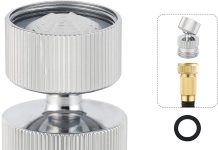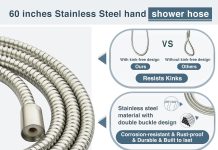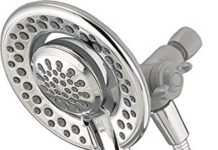Have you ever wondered if shower hoses come in different sizes? Well, the good news is they do! Shower hoses, just like any other plumbing fixture, come in a variety of sizes to accommodate different needs and preferences. Whether you’re looking for a longer hose for added convenience or a shorter one for a compact shower space, there’s a size that’s just right for you. In this article, we will explore the different sizes available and how to choose the perfect shower hose for your bathroom. So, let’s get started and find the ideal size to enhance your showering experience!
Table of Contents
Standard Sizes
When it comes to shower hoses, there is a wide range of sizes to choose from. Standard sizes typically range from 1.5 meters (5 feet) to 2 meters (6.5 feet) in length. These lengths are suitable for most shower setups and provide ample flexibility and reach for comfortable showering. Standard sizes are readily available in most hardware stores and online retailers, making them a convenient choice for many households.
Extended Lengths
In some cases, standard sizes may not be sufficient for certain shower setups. For those who require extra reach or have unique bathroom configurations, extended lengths are available. These shower hoses can go beyond the standard 2-meter mark, providing additional flexibility for hard-to-reach areas. Extended lengths can be particularly useful for walk-in showers or shower heads mounted at unconventional heights.
Flexible vs. Rigid
Shower hoses come in both flexible and rigid options, and the choice between the two largely depends on personal preference and showering habits. Flexible hoses, typically made of stainless steel or reinforced plastic, offer a greater range of motion and are easier to maneuver around the shower. They can be bent and twisted without causing damage, making them ideal for households with children or individuals who require a more adaptable showering experience.
On the other hand, rigid shower hoses, often crafted from metal, provide a sleek and sturdy design. While they may not offer the same level of flexibility as their counterparts, rigid hoses can enhance the overall aesthetics of the bathroom. They can also be a good option for those who prefer a more firm and stable showering experience.
Material Types
Shower hoses are available in a variety of materials, each with its own advantages and considerations. Stainless steel is a popular choice due to its durability and resistance to corrosion. It is easy to clean and maintain, making it a hygienic option for any bathroom. Reinforced plastic hoses, on the other hand, are lightweight and affordable. They are often a cost-effective alternative to stainless steel hoses while still providing adequate performance.
Other material options include brass, which offers durability and a classic appearance, and rubber, which provides a softer and more flexible feel. When selecting a shower hose, it’s essential to consider the material that best suits your needs in terms of longevity, maintenance, and aesthetic preferences.
Thread Sizes
When it comes to attaching the shower hose to the showerhead or faucet, thread sizes play a crucial role. Standard shower hose connectors typically have a 1/2-inch thread, ensuring compatibility with most shower setups. However, it is essential to check the specifications of your existing fixtures to ensure a proper fit. Some shower hoses may have different thread sizes or adapters included, allowing for seamless integration with various shower systems.
Specialty Sizes
Apart from standard and extended lengths, specialty sizes are available to accommodate specific requirements. These may include shorter shower hoses for hand-held showerheads or longer hoses for overhead rainfall showerheads. Specialty sizes can also cater to unique bathroom arrangements or specific needs, providing a tailored solution for every shower configuration.
Compatibility with Fixtures
Before purchasing a new shower hose, it is vital to consider the compatibility with your existing fixtures. Assess the type of showerhead or faucet you have and ensure that the hose you select will fit securely and function correctly. Some shower hoses are specifically designed for certain types of fixtures, so checking the manufacturer’s recommendations or consulting a professional can help ensure a seamless match.
Replacement and Extension Options
In some cases, you may need to replace an existing shower hose due to wear and tear or simply desire an upgrade. Replacement options provide an opportunity to choose a different size or material that better suits your preferences. When replacing a shower hose, be sure to measure the length and check the specifications of your current hose to select the appropriate replacement.
Furthermore, if you require additional length without replacing the entire hose, extension options are available. These extensions can easily be attached to your existing shower hose, providing the desired length without the need for a full replacement.
Considerations for Choosing the Right Size
When deciding on the appropriate shower hose size, there are several factors to consider. Firstly, assess the layout and dimensions of your shower area and determine the required length for optimal reach and flexibility. Consider the height of the showerhead or faucet, the distance from the wall, and any other unique aspects of your bathroom that may impact the selection.
Additionally, take into account personal preferences and showering habits. Some individuals may prefer a longer hose for greater mobility, while others may prioritize a more compact option. Balancing functionality, comfort, and aesthetics will help guide you towards the right shower hose size for your needs.
Conclusion
In conclusion, shower hoses do come in different sizes to accommodate varying shower setups and individual preferences. Standard sizes offer versatility and are readily available, while extended lengths cater to those who require extra reach. The choice between flexible and rigid hoses depends on personal preference, with flexible hoses offering greater maneuverability and rigid hoses providing a sleek, stable design.
Material types also play a role, with options such as stainless steel, reinforced plastic, brass, and rubber offering different benefits in terms of durability, maintenance, and aesthetics. The thread size of the shower hose should align with the existing fixtures, and specialty sizes are available for specific requirements.
Before making a purchase, it’s crucial to consider compatibility with fixtures, explore replacement and extension options, and take into account the layout and dimensions of your shower area. By considering these factors and weighing personal preferences, you can select the right shower hose size that enhances your showering experience and adds functionality and style to your bathroom.






















